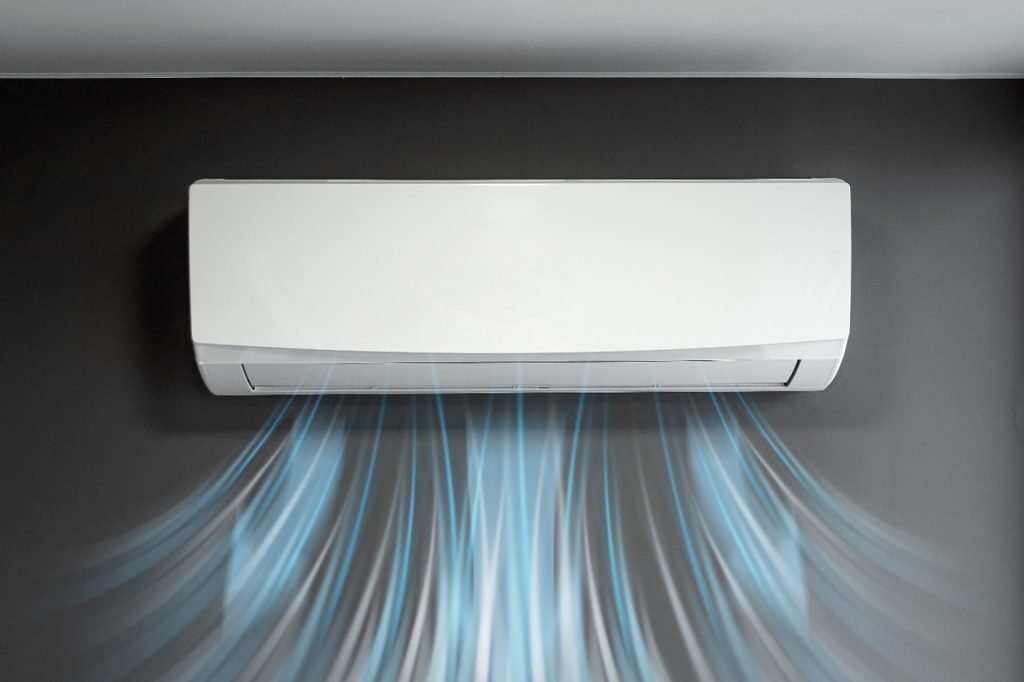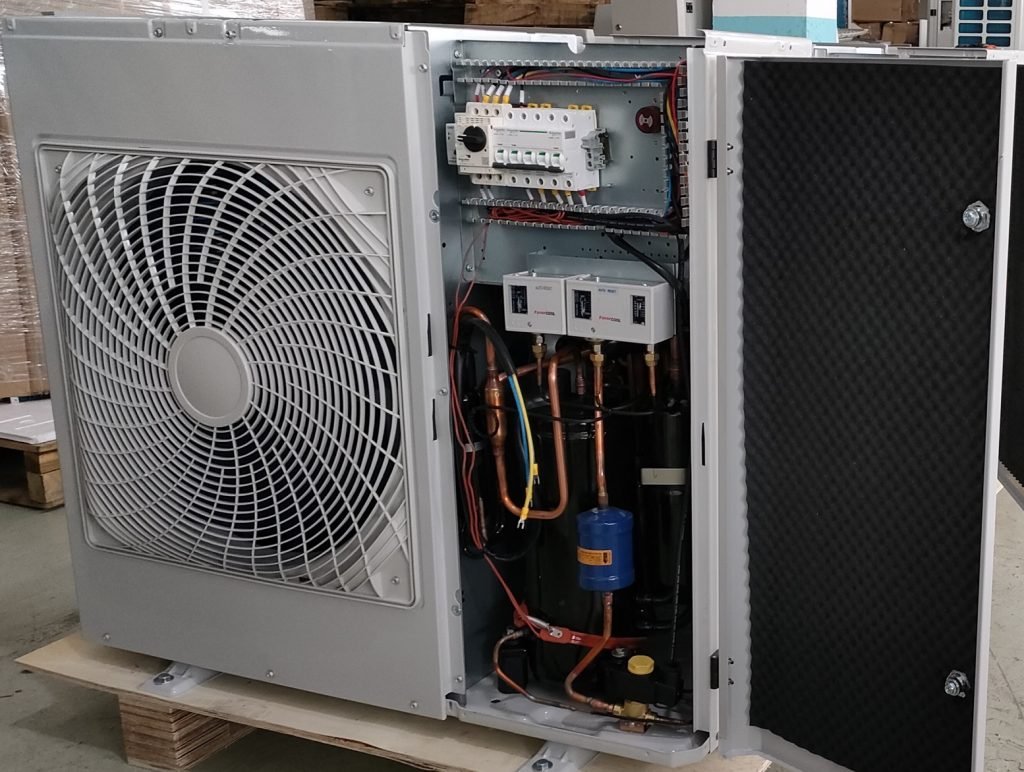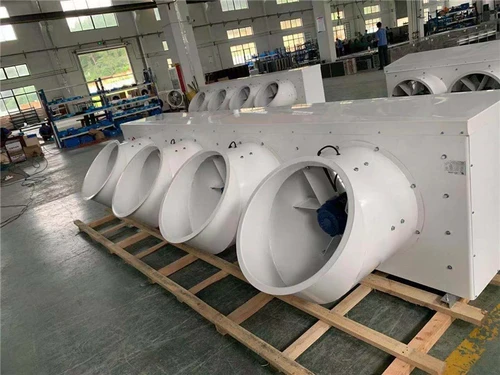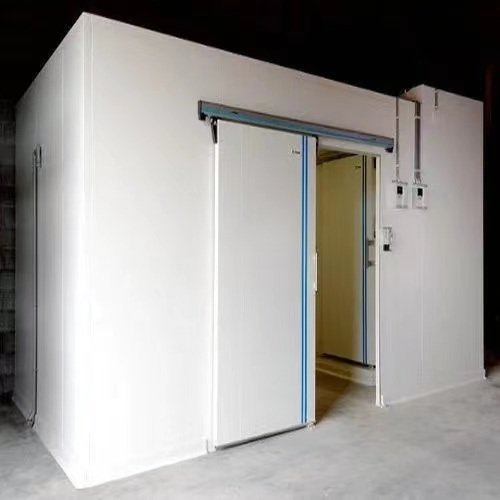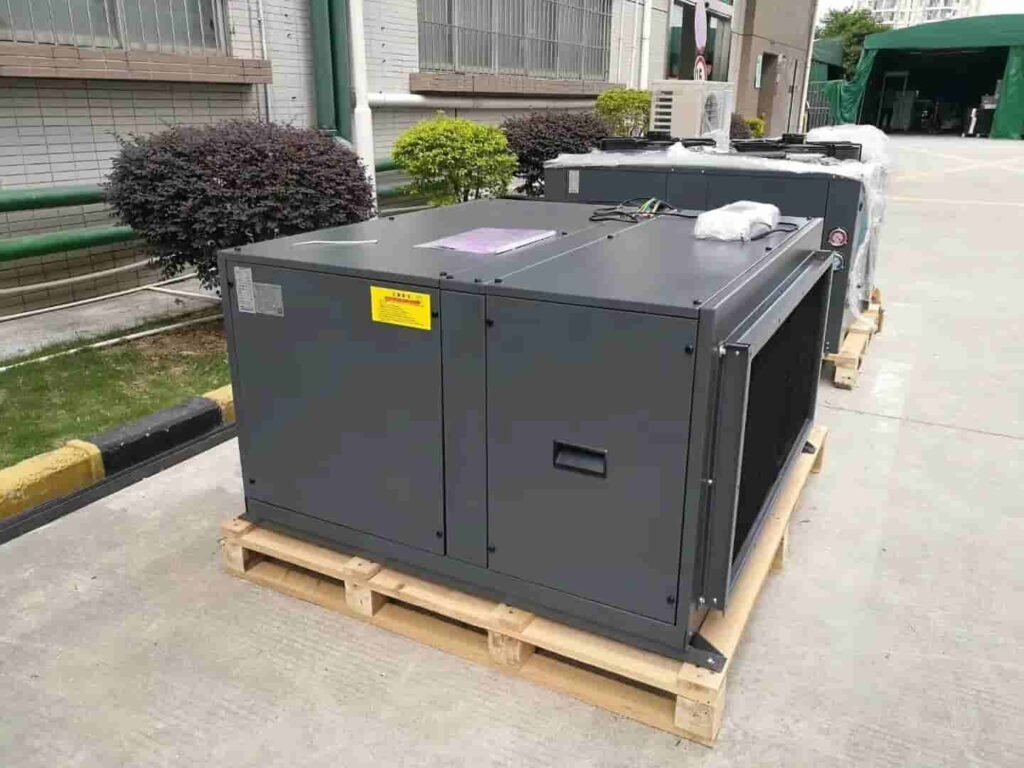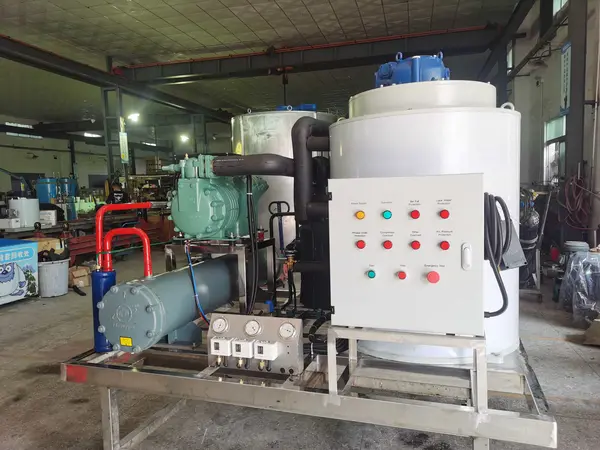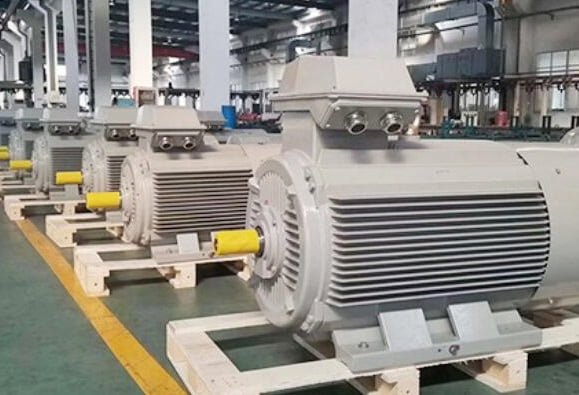ಪ್ಲೇಟ್ ಶಾಖ ವಿನಿಮಯಕಾರಕವು ಹೊಸ ಪ್ರಕಾರದ ಹೆಚ್ಚಿನ ಸಾಮರ್ಥ್ಯದ ಶಾಖ ವಿನಿಮಯಕಾರಕವಾಗಿದೆ , ಇದು ಸುಕ್ಕುಗಟ್ಟಿದ ಆಕಾರದೊಂದಿಗೆ ಸರಣಿ ಲೋಹದ ಹಾಳೆಗಳಿಂದ ಮಾಡಲ್ಪಟ್ಟಿದೆ. ವಿವಿಧ ಫಲಕಗಳ ಸಮಯದಲ್ಲಿ ತೆಳುವಾದ ಆಯತಾಕಾರದ ಚಾನಲ್ಗಳನ್ನು ಹೊಂದಿರುತ್ತವೆ , ಮತ್ತು ಪ್ಲೇಟ್ಗಳ ಮೂಲಕ ಶಾಖವನ್ನು ವಿನಿಮಯ ಮಾಡಿಕೊಳ್ಳಿ.
ಪ್ಲೇಟ್ ಶಾಖ ವಿನಿಮಯಕಾರಕವು ದ್ರವ-ದ್ರವ ಮತ್ತು ದ್ರವ-ಉಗಿ ಶಾಖ ವಿನಿಮಯಕ್ಕೆ ಸೂಕ್ತವಾದ ಸಾಧನವಾಗಿದೆ. ಮುಂತಾದ ವೈಶಿಷ್ಟ್ಯಗಳನ್ನು ಹೊಂದಿದೆ: ಹೆಚ್ಚಿನ ಶಾಖ ವಿನಿಮಯ ದಕ್ಷತೆ, ಸಣ್ಣ ಶಾಖದ ನಷ್ಟ, ಕಾಂಪ್ಯಾಕ್ಟ್ ಮತ್ತು ಬೆಳಕಿನ ರಚನೆ, ಸಣ್ಣ ಹೆಜ್ಜೆಗುರುತು, ಸುಲಭ ಅನುಸ್ಥಾಪನ ಮತ್ತು ಸ್ವಚ್ಛಗೊಳಿಸುವ, ವ್ಯಾಪಕ ಅಪ್ಲಿಕೇಶನ್, ಮತ್ತು ದೀರ್ಘ ಸೇವಾ ಜೀವನ, ಇತ್ಯಾದಿ.
ಇಂದು ನಾವು ಪ್ಲೇಟ್ ಶಾಖ ವಿನಿಮಯಕಾರಕದ ಬಗ್ಗೆ ಹೆಚ್ಚಿನ ಜ್ಞಾನವನ್ನು ಮಾತನಾಡುತ್ತೇವೆ.
ರಚನೆ
ಮುಖ್ಯ ಘಟಕಗಳು: ಸೀಲ್ ಗ್ಯಾಸ್ಕೆಟ್, ಪ್ಲೇಟ್ ಸರಿಪಡಿಸಿ, ಸಕ್ರಿಯ ಪ್ಲೇಟ್, ತಿರುಪು, ಮೇಲಿನ ಕಾಲಮ್, ಕೆಳಗಿನ ಕಾಲಮ್, ಬೆಂಬಲ ರಾಡ್ , ಫ್ರೇಮ್ ಪ್ಲೇಟ್, ಇತ್ಯಾದಿ.
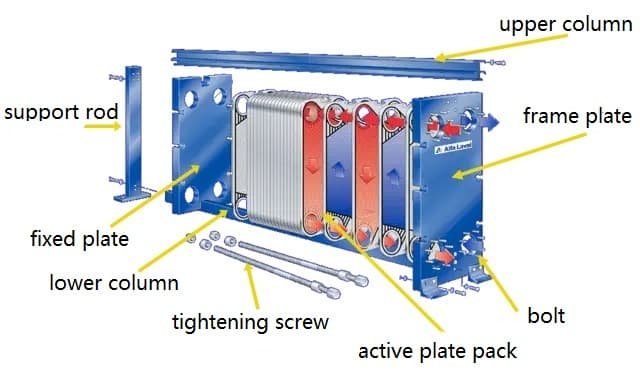
ಪ್ಲೇಟ್ ಶಾಖ ವಿನಿಮಯಕಾರಕ ಹೊಂದಿದೆ 2 ರೀತಿಯ: ಫ್ರೇಮ್ ಪ್ರಕಾರ (ಬೇರ್ಪಡಿಸಬಹುದಾದ) ಮತ್ತು ಬ್ರೇಜಿಂಗ್ ಪ್ರಕಾರ, ಅಷ್ಟರಲ್ಲಿ ಇವೆ 2 ಫಲಕಗಳ ವಿಧಗಳು: ಸುಕ್ಕುಗಟ್ಟಿದ ತಟ್ಟೆ ಮತ್ತು ಸುತ್ತಿನ ಆಕಾರದ ತಟ್ಟೆ.
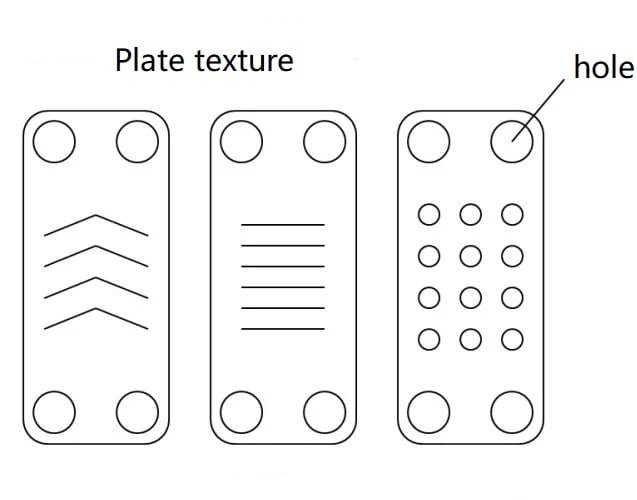
ಪ್ಲೇಟ್ ಟೆಕ್ಸ್ಚರ್ನ ಕಾರ್ಯಗಳು
ಇದು ದ್ರವ ಪ್ರಕ್ಷುಬ್ಧತೆಯನ್ನು ಉಂಟುಮಾಡುತ್ತದೆ, ಶಾಖ ವರ್ಗಾವಣೆಯನ್ನು ಹೆಚ್ಚಿಸುತ್ತದೆ, ಮತ್ತು ಪಕ್ಕದ ಫಲಕಗಳ ಸುಕ್ಕುಗಳು ಸಂಪರ್ಕ ಪ್ರತಿರೋಧ ಬಿಂದುಗಳನ್ನು ರೂಪಿಸುತ್ತವೆ, ಒತ್ತಡ ಪ್ರತಿರೋಧವನ್ನು ಸುಧಾರಿಸಿ.
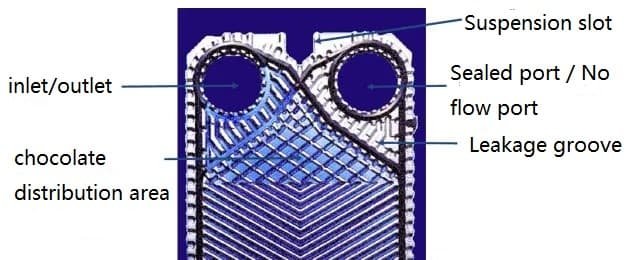
ಚಾಕೊಲೇಟ್ ವಿತರಣಾ ಪ್ರದೇಶ
ಇಡೀ ತಟ್ಟೆಯಲ್ಲಿ ದ್ರವವನ್ನು ಸಮವಾಗಿ ಹರಿಯುವಂತೆ ಮಾಡಿ, ನಲ್ಲಿ ಅದೇ ಒತ್ತಡದ ಕುಸಿತದೊಂದಿಗೆ “ಎ” ಮತ್ತು “ಬಿ”, ಒತ್ತಡದ ನಷ್ಟವನ್ನು ಕಡಿಮೆ ಮಾಡಿ, ಪರಿಣಾಮಕಾರಿ ಶಾಖ ವರ್ಗಾವಣೆಯನ್ನು ಹೆಚ್ಚಿಸಿ, ಮತ್ತು ಸಮಾನಾಂತರ ಹರಿವನ್ನು ಅನುಮತಿಸಿ.
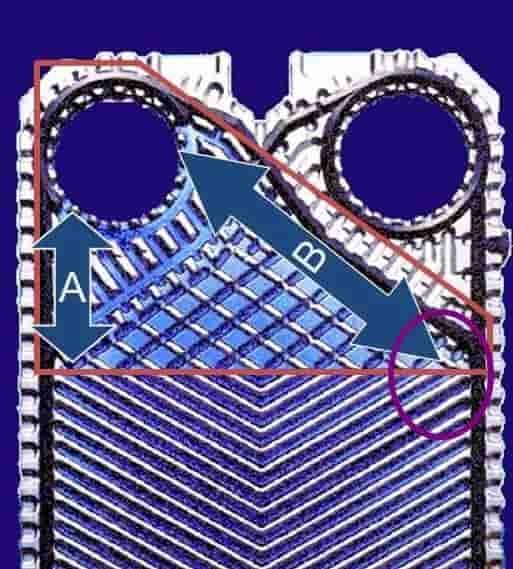
ಪ್ಲೇಟ್ ಶಾಖ ವಿನಿಮಯಕಾರಕವು ಚಾನಲ್-ಆಕಾರದ ಪ್ಲೇಟ್ ಪ್ಯಾಕೇಜ್ನಲ್ಲಿ ಜೋಡಿಸಲಾದ ಪ್ಲೇಟ್ಗಳ ಗುಂಪನ್ನು ಒಳಗೊಂಡಿದೆ. ಎರಡು ತುದಿಗಳು ಪೈಪ್ ಸಂಪರ್ಕಗಳೊಂದಿಗೆ ಕೆಳಭಾಗದ ಫಲಕಗಳನ್ನು ಹೊಂದಿವೆ. ಸಂಪೂರ್ಣ ಪ್ಲೇಟ್ ಅನ್ನು ನಿರ್ವಾತ ಬ್ರೇಜಿಂಗ್ ಮೂಲಕ ತಯಾರಿಸಲಾಗುತ್ತದೆ.
ಪಕ್ಕದ ಚಾನಲ್ಗಳಲ್ಲಿ ಕ್ರಮವಾಗಿ ಎರಡು ಮಾಧ್ಯಮ ಹರಿವು. ಎರಡು ಮಾಧ್ಯಮಗಳ ನಡುವಿನ ಶಾಖ ವಿನಿಮಯವನ್ನು ಹೆಚ್ಚಿಸಲು ಪಕ್ಕದ ಚಾನಲ್ಗಳ ನಡುವಿನ ಫಲಕಗಳನ್ನು ಸುಕ್ಕುಗಟ್ಟಿದ ಆಕಾರಕ್ಕೆ ಒತ್ತಲಾಗುತ್ತದೆ. ಫಾರ್ ಬ್ರೇಜ್ಡ್ ಪ್ಲೇಟ್ ಶಾಖ ವಿನಿಮಯಕಾರಕದಲ್ಲಿ ಶೈತ್ಯೀಕರಣ, ಅದಕ್ಕಿಂತ ಹೆಚ್ಚು ನೀರಿನ ಹರಿವಿನ ಚಾನಲ್ ಯಾವಾಗಲೂ ಇರುತ್ತದೆ ಶೀತಕ ಹರಿವಿನ ಚಾನಲ್.
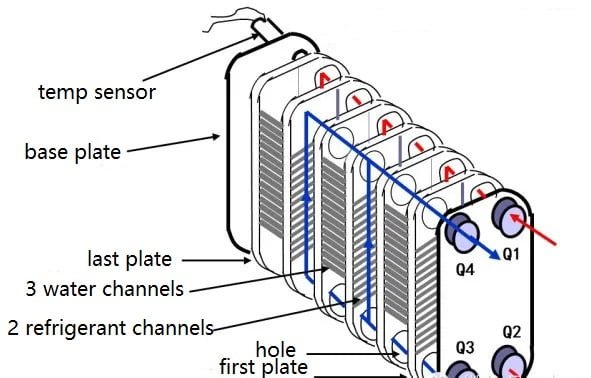
ಮೇಲೆ ಸಿಂಗಲ್-ಸೈಡ್ ಫ್ಲೋ ಸ್ಕೀಮಾ ಇದೆ, ಕೆಲವು ಶಾಖ ವಿನಿಮಯಕಾರಕಗಳನ್ನು ಕರ್ಣೀಯ ಹರಿವಿಗಾಗಿ ತಯಾರಿಸಲಾಗುತ್ತದೆ, ಅರ್ಥ “Q1” ಮತ್ತು “Q3” ಒಂದು ಮಾಧ್ಯಮವನ್ನು ಹೊಂದಿರುತ್ತದೆ, ಸಮಯದಲ್ಲಿ “Q2” ಮತ್ತು “Q4” ಇನ್ನೊಂದು ಮಾಧ್ಯಮವನ್ನು ಒಳಗೊಂಡಿರುತ್ತದೆ.
ಜೋಡಿಸುವ ಮಾರ್ಗವೆಂದರೆ ಸ್ಕ್ರೂ ಮತ್ತು ಬೋಲ್ಟ್ ರಚನೆ, ಇದು ಆನ್-ಸೈಟ್ ಡಿಸ್ಅಸೆಂಬಲ್ ಮತ್ತು ದುರಸ್ತಿಗೆ ಅನುಕೂಲಕರವಾಗಿದೆ.
ಕೆಲಸದ ತತ್ವ
ಪ್ಲೇಟ್ ಶಾಖ ವಿನಿಮಯಕಾರಕದ ಪ್ಲೇಟ್ಗಳನ್ನು ಸೀಲ್ ಮಾಡಲಾಗುತ್ತದೆ ಮತ್ತು ಶೀತ/ಬಿಸಿ ದ್ರವದ ಚಾನಲ್ಗಳನ್ನು ಪ್ರತ್ಯೇಕಿಸಲು ಸೀಲಿಂಗ್ ಗ್ಯಾಸ್ಕೆಟ್ಗಳ ಮೂಲಕ ಮಾರ್ಗದರ್ಶನ ಮಾಡಲಾಗುತ್ತದೆ.. ಶೀತ/ಬಿಸಿ ಶಾಖ ವಿನಿಮಯ ಮಾಧ್ಯಮವು ಆಯಾ ಚಾನಲ್ಗಳ ಮೂಲಕ ಹರಿಯುತ್ತದೆ ಮತ್ತು ಸೆಟ್ ತಾಪಮಾನವನ್ನು ಸಾಧಿಸಲು ಪ್ರತ್ಯೇಕವಾದ ಪ್ಲೇಟ್ಗಳೊಂದಿಗೆ ಶಾಖವನ್ನು ವಿನಿಮಯ ಮಾಡುತ್ತದೆ.
ಪ್ರತಿಯೊಂದು ಫಲಕವು ನಾಲ್ಕು ಮೂಲೆಗಳಲ್ಲಿ ತೆರೆಯುವಿಕೆಯನ್ನು ಹೊಂದಿದೆ, ನಂತರ ವಿತರಣಾ ಪೈಪ್ಲೈನ್ ಮತ್ತು ಸಂಗ್ರಹಣೆ ಪೈಪ್ಲೈನ್ಗೆ ರೂಪಿಸಿ, ಪ್ಲೇಟ್ ಪ್ಯಾಕ್ನಲ್ಲಿ ಜೋಡಿಸಿದ ನಂತರ. ಶೀತ / ಬಿಸಿ ಮಾಧ್ಯಮದ ಶಾಖ ವಿನಿಮಯದ ನಂತರ, ಇದು ಆಯಾ ಸಂಗ್ರಹ ಪೈಪ್ಗಳಿಂದ ಹಿಂತಿರುಗಿ ನಂತರ ಮರುಬಳಕೆಯಾಗುತ್ತದೆ.
ಏಕ ಹರಿವಿನ ರಚನೆ: ಕೇವಲ ಎರಡು ಪ್ಲೇಟ್ಗಳು ಶಾಖವನ್ನು ವಿನಿಮಯ ಮಾಡಿಕೊಳ್ಳುವುದಿಲ್ಲ – ಮುಂಭಾಗ (ಪ್ರಥಮ) ಮತ್ತು ಕೆಳಗೆ (ಕೊನೆಯ) ಫಲಕಗಳು.
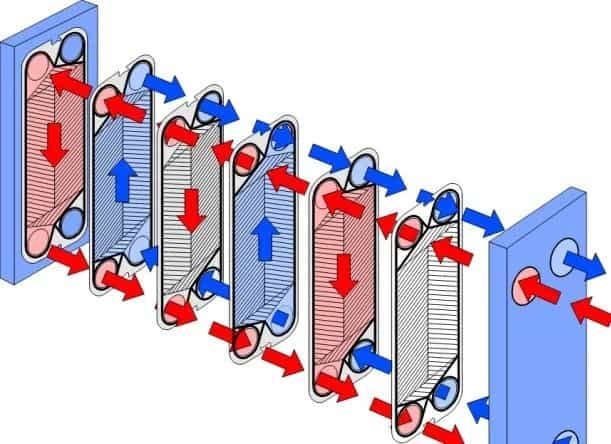
ಡಬಲ್-ಫ್ಲೋ ರಚನೆ: ಪ್ರತಿ ಹರಿವು ಹೊಂದಿದೆ 3 ಶಾಖ ವಿನಿಮಯವಿಲ್ಲದೆ ಫಲಕಗಳು.
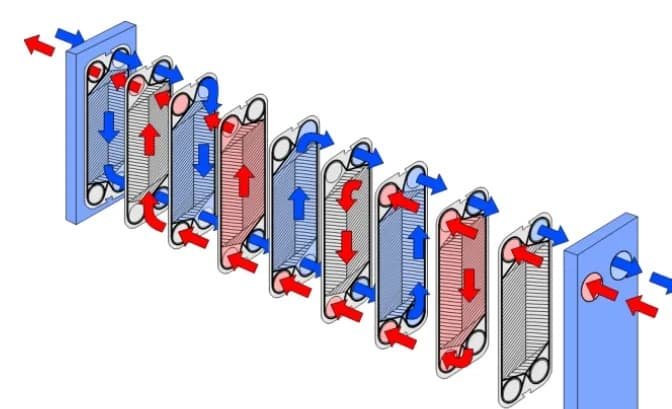
ಪ್ಲೇಟ್ ವಸ್ತು
| ಪ್ಲೇಟ್ ವಸ್ತು | ವಸ್ತು ಸರಣಿ ಸಂಖ್ಯೆ | ಸೂಕ್ತವಾದ ಮಧ್ಯಮ |
|---|---|---|
| ತುಕ್ಕಹಿಡಿಯದ ಉಕ್ಕು | 304, 316,316ಎಲ್ | ಶುದ್ಧ ನೀರು, ನದಿ ನೀರು, ಅಡುಗೆ ಎಣ್ಣೆ, ಖನಿಜ ತೈಲ |
| ಟೈಟಾನಿಯಂ ಮತ್ತು ಟೈಟಾನಿಯಂ ಪಲ್ಲಾಡಿಯಮ್ | ಆಫ್, ಟಿ-ಪಿಡಿ | ಸಮುದ್ರದ ನೀರು, ಉಪ್ಪುನೀರು, ಲವಣಯುಕ್ತ ದ್ರಾವಣ |
| ನಿಕಲ್ | ರಲ್ಲಿ | ಹೆಚ್ಚಿನ ತಾಪಮಾನ, ಹೆಚ್ಚಿನ ಸಾಂದ್ರತೆಯ ಕಾಸ್ಟಿಕ್ ಸೋಡಾ |
| ಹ್ಯಾಸ್ಟೆಲ್ಲೋಯ್ | ಹ್ಯಾಸ್ಟೆಲ್ಲೋಯ್ | ಕೇಂದ್ರೀಕೃತ ಸಲ್ಫ್ಯೂರಿಕ್ ಆಮ್ಲ, ಹೈಡ್ರೋಕ್ಲೋರಿಕ್ ಆಮ್ಲ, ಫಾಸ್ಪರಿಕ್ ಆಮ್ಲ |
| ವಿಶೇಷ ಉಕ್ಕು | SM0254, 20Cr, 18ರಲ್ಲಿ | ಸಲ್ಫ್ಯೂರಿಕ್ ಆಮ್ಲವನ್ನು ದುರ್ಬಲಗೊಳಿಸಿ, ದುರ್ಬಲಗೊಳಿಸಿದ ಉಪ್ಪು ಜಲೀಯ ದ್ರಾವಣ, ಅಜೈವಿಕ ಜಲೀಯ ದ್ರಾವಣ |
ಗ್ಯಾಸ್ಕೆಟ್
ಸೋರಿಕೆಯನ್ನು ತಡೆಗಟ್ಟಲು ಶಾಖ ವಿನಿಮಯಕಾರಕ ಫಲಕಗಳ ನಡುವೆ ಸೀಲಿಂಗ್ ಅಂಶಗಳಾಗಿ ಗ್ಯಾಸ್ಕೆಟ್ಗಳನ್ನು ಬಳಸಲಾಗುತ್ತದೆ. ರಲ್ಲಿ HVAC ಉದ್ಯಮ, ಗ್ಯಾಸ್ಕೆಟ್ಗಳು ಮುಖ್ಯವಾಗಿ ರಬ್ಬರ್ ಉತ್ಪನ್ನಗಳಾಗಿವೆ, ಇದು ತಾಪಮಾನ ಮತ್ತು ಮಧ್ಯಮದಿಂದ ಹೆಚ್ಚು ಪರಿಣಾಮ ಬೀರುತ್ತದೆ.
ಗ್ಯಾಸ್ಕೆಟ್ ಅವಶ್ಯಕತೆ:
ವಯಸ್ಸಾದ ವಿರೋಧಿ, ಕಣ್ಣೀರು ನಿರೋಧಕ, ಹೆಚ್ಚಿನ ಸ್ಥಿತಿಸ್ಥಾಪಕತ್ವ
ಸೀಲಿಂಗ್ ಸಂಪರ್ಕ ಮೇಲ್ಮೈ ಗಾತ್ರದಲ್ಲಿ ನಿಖರವಾಗಿದೆ ಮತ್ತು ಎಚ್ಚರಿಕೆಯ ಸಿಗ್ನಲ್ ರಂಧ್ರವು ಸೂಕ್ಷ್ಮವಾಗಿರುತ್ತದೆ
ಅಂಟು-ಮುಕ್ತ ರಚನೆ, ಡಿಸ್ಅಸೆಂಬಲ್ ಮಾಡಲು ಮತ್ತು ಜೋಡಿಸಲು ಸುಲಭ
ಗ್ಯಾಸ್ಕೆಟ್ ಆಯ್ಕೆ:
ಮಧ್ಯಮ ವೈಶಿಷ್ಟ್ಯಗಳ ಪ್ರಕಾರ
| ಗ್ಯಾಸ್ಕೆಟ್ ವಸ್ತು | ವಸ್ತು ಕೋಡ್ ಸಂಖ್ಯೆ | ತಾಪಮಾನ | ಸೂಕ್ತವಾದ ಮಧ್ಯಮ |
|---|---|---|---|
| ನೈಟ್ರೈಲ್ ಬುಟಾಡಿಯನ್ ರಬ್ಬರ್ | NBR | -15 ~ +120 °C | ನೀರು, ಸಮುದ್ರದ ನೀರು, ಉಪ್ಪುನೀರು, ಖನಿಜ ತೈಲ |
| ನೈಟ್ರೈಲ್ ಬುಟಾಡಿಯನ್ ರಬ್ಬರ್ + | HNBR | -15 ~ +140 °C | ಹೆಚ್ಚಿನ ತಾಪಮಾನ ಖನಿಜ ತೈಲ, ಬಿಸಿ ನೀರು |
| ಎಥಿಲೀನ್ ಪ್ರೊಪಿಲೀನ್ ಡೈನೆ ಮೊನೊಮರ್ | EPDM | -25 ~ +150 °C | ಹೆಚ್ಚಿನ ತಾಪಮಾನದ ನೀರು, ಆಮ್ಲ, ಕ್ಷಾರ |
| ಎಥಿಲೀನ್ ಪ್ರೊಪಿಲೀನ್ ಡೈನೆ ಮೊನೊಮರ್ + | HEPDM | -25 ~ +170 °C | ನೀರಿನ ಆವಿ, ಆಮ್ಲ, ಕ್ಷಾರ |
HVACR ಇಂಡಸ್ಟ್ರಿ ಅಪ್ಲಿಕೇಶನ್
– ಜಿಲ್ಲಾ ತಾಪನ ವ್ಯವಸ್ಥೆ
– ಜಿಲ್ಲಾ ತಂಪಾಗಿಸುವ ವ್ಯವಸ್ಥೆ
– ಶಾಖ ಮತ್ತು ವಿದ್ಯುತ್ ವ್ಯವಸ್ಥೆ
– ಭೂಶಾಖದ ನೀರಿನ ತಾಪನ ವ್ಯವಸ್ಥೆ
– ತ್ವರಿತ ದೇಶೀಯ ಬಿಸಿನೀರಿನ ವ್ಯವಸ್ಥೆ
– ಈಜುಕೊಳ ಸ್ಥಿರ ತಾಪಮಾನ ವ್ಯವಸ್ಥೆ
– ಸೌರ ನೀರಿನ ತಾಪನ ವ್ಯವಸ್ಥೆ
– ಹವಾನಿಯಂತ್ರಣ ವ್ಯವಸ್ಥೆ
– ಕೂಲಿಂಗ್ ಟವರ್
– ಅಂತರ್ಜಲ ತಂಪು/ಉಷ್ಣ ಮೂಲ ವ್ಯವಸ್ಥೆ
– ಶಾಖ ಚೇತರಿಕೆ ವ್ಯವಸ್ಥೆ
– ಐಸ್ ಶೇಖರಣಾ ವ್ಯವಸ್ಥೆ
– ಸೀಲಿಂಗ್ ಕೂಲಿಂಗ್ ವ್ಯವಸ್ಥೆ
ಅನುಸ್ಥಾಪನ
ತಲೆಕೆಳಗಾದ ಅನುಸ್ಥಾಪನೆ
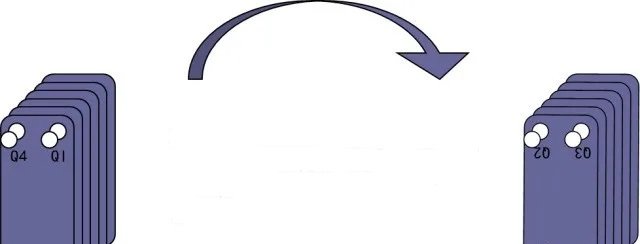
ಕೆಲವು ಪ್ಲೇಟ್ ಶಾಖ ವಿನಿಮಯಕಾರಕಗಳು ತಲೆಕೆಳಗಾಗಿ ಇರಿಸಬಹುದು, ದಯವಿಟ್ಟು ಪೂರೈಕೆದಾರರೊಂದಿಗೆ ದೃಢೀಕರಿಸಿ.
ಅನುಸ್ಥಾಪನೆಯ ಭಂಗಿ

ಲಂಬವಾಗಿ ಸ್ಥಾಪಿಸಬೇಕು, ಅಡ್ಡಲಾಗಿ ಅಲ್ಲ.
ಅನುಸ್ಥಾಪನ “1” ಸರಿಯಾಗಿದೆ, “2” ಮತ್ತು “3” ಸಹ ಸರಿ, “4” ತಪ್ಪಾಗಿದೆ.
ಪೈಪ್ಲೈನ್ ಲೇಔಟ್
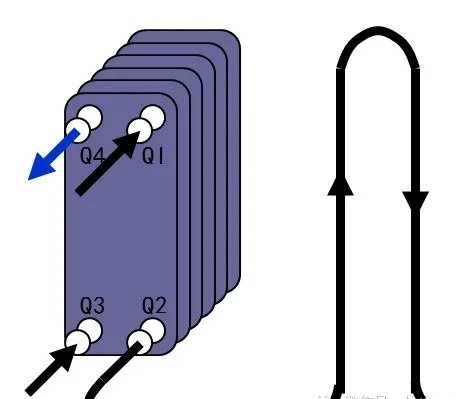
ಪ್ಲೇಟ್ ಶಾಖ ವಿನಿಮಯಕಾರಕವನ್ನು ತಲುಪಲು ಕಂಪನ ಮತ್ತು ಪೈಪ್ ಥರ್ಮಲ್ ವಿಸ್ತರಣೆಯನ್ನು ಅನುಮತಿಸಬೇಡಿ.
ಕ್ರಿಯೆಗಳು:
– BPHE ನಡುವೆ ರಬ್ಬರ್ ಗ್ಯಾಸ್ಕೆಟ್ಗಳನ್ನು ಸೇರಿಸಿ (ಬ್ರೇಜ್ಡ್ ಪ್ಲೇಟ್ ಶಾಖ ವಿನಿಮಯಕಾರಕ) ಮತ್ತು ಬ್ರಾಕೆಟ್.
– ಸಂಕೋಚಕಕ್ಕಾಗಿ ಕಂಪನ ಡ್ಯಾಂಪರ್ಗಳನ್ನು ಬಳಸಿ.
– ನೇರ ಪೈಪ್ ವಿಭಾಗವು ಉದ್ದವಾಗಿದ್ದಾಗ ಬೆಲ್ಲೋ ಅಥವಾ ಇತರ ಕಂಪನ ಹೀರಿಕೊಳ್ಳುವ ಸಾಧನವನ್ನು ಬಳಸಿ. ಒಳಹರಿವಿನ ಪೈಪ್ಗಿಂತ ಹೆಚ್ಚಿನ ರಿಟರ್ನ್ ಬೆಂಡ್ ನೀರು BPHE ಅನ್ನು ತುಂಬುವಂತೆ ಮಾಡುತ್ತದೆ (ಮೇಲಿನ ಚಿತ್ರವನ್ನು ನೋಡಿ).
ಪೈಪ್ಲೈನ್ ವೆಲ್ಡಿಂಗ್
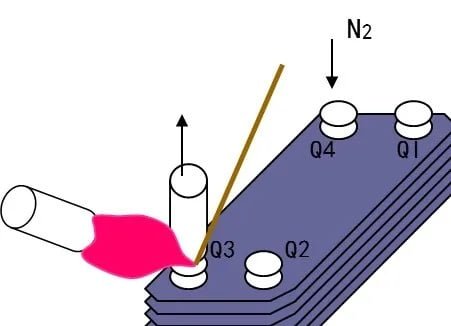
ದ್ರಾವಕದೊಂದಿಗೆ ವೆಲ್ಡಿಂಗ್ ಮೇಲ್ಮೈಯನ್ನು ಸ್ವಚ್ಛಗೊಳಿಸಿ ಮತ್ತು ಡಿಗ್ರೀಸ್ ಮಾಡಿ. ಆಕ್ಸಿಡೀಕರಣವನ್ನು ತಪ್ಪಿಸಲು ಮತ್ತು BPHE ಅನ್ನು ತಂಪಾಗಿಸಲು, ಬೆಸುಗೆ ಹಾಕಿದ ಕೊಳವೆಗಳ ಮೂಲಕ ಸಾರಜನಕವನ್ನು ಸ್ಫೋಟಿಸಿ. ನೀರಿನ ಪಕ್ಕದ ಪೈಪ್ಲೈನ್ನಲ್ಲಿ ನೀರು ಹರಿಯುವಂತೆ ನೋಡಿಕೊಳ್ಳಿ.
ವೆಲ್ಡಿಂಗ್ ಪ್ರಾರಂಭವಾಗುವ ಮೊದಲು ನೀರನ್ನು ಹರಿಯುವಂತೆ ಇರಿಸಿ ಮತ್ತು BPHE ಅನ್ನು ಕೈಯಿಂದ ಸ್ಪರ್ಶಿಸುವವರೆಗೆ ಅದನ್ನು ಹರಿಯುವಂತೆ ಇರಿಸಿ.
ಬೆಸುಗೆ ಕನಿಷ್ಠ ಹೊಂದಿರಬೇಕು 45% ಬೆಳ್ಳಿ ಮತ್ತು ಬ್ರೇಜಿಂಗ್ ಅನ್ನು ಕಡಿಮೆ ಪ್ರಮಾಣದಲ್ಲಿ ನಡೆಸಬೇಕು 650 ℃. ಯಾವುದೇ ಸಂದರ್ಭದಲ್ಲಿ, ಬೆಸುಗೆ ಮೀರಬಾರದು 800 ℃.
ಟಿಐಜಿ (ಟಂಗ್ಸ್ಟನ್ ಜಡ ಅನಿಲ ಕವಚದ ಆರ್ಕ್ ವೆಲ್ಡಿಂಗ್) ಕಡಿಮೆ ಶಾಖದ ಬಿಡುಗಡೆಯ ಬೆಸುಗೆ ವಿಧಾನವಾಗಿದೆ.
BPHE ಸೋರಿಕೆ ಪರಿಶೀಲನಾಪಟ್ಟಿ
ಸಿಸ್ಟಮ್ ಪರಿಶೀಲನೆ
– ಸ್ಥಗಿತಗೊಳಿಸುವ ಅನುಕ್ರಮ ಮತ್ತು ಆವಿಯಾಗುವಿಕೆಯ ತಾಪಮಾನವನ್ನು ಪರಿಶೀಲಿಸಿ
– ಇತರ ಸಾಧನಗಳಿಂದ ಕಂಪನಗಳನ್ನು ಪರಿಶೀಲಿಸಿ
– ವಿದ್ಯುತ್ ಕವಾಟ ಅಥವಾ ಸೊಲೀನಾಯ್ಡ್ ಕವಾಟವನ್ನು ನೀರಿನ ಬದಿಯಲ್ಲಿ ಅನ್ವಯಿಸಲಾಗುತ್ತದೆ?
– ನೀರು ಹೆಚ್ಚುವರಿ ಕ್ಲೋರೈಡ್ ಅಯಾನುಗಳು ಅಥವಾ ಇತರ ನಾಶಕಾರಿ ಏಜೆಂಟ್ಗಳನ್ನು ಹೊಂದಿದೆಯೇ?
ಬಾಹ್ಯ ತಪಾಸಣೆ
– ನೀರಿನ ಒಳಹರಿವಿನ ಎದುರು ಹಿಂಭಾಗದ ಕವರ್ನಲ್ಲಿ ಉಬ್ಬು ಇದೆಯೇ?
– ಎರಡೂ ಬದಿಯಲ್ಲಿ ವಿರೂಪತೆಯ ಯಾವುದೇ ಚಿಹ್ನೆಗಳು ಇವೆಯೇ?
– ಪೈಪ್ ಸಂಪರ್ಕಗಳು ಬಿಗಿಯಾಗಿವೆ?
– ಸಾರಿಗೆ ಅಥವಾ ಅನುಸ್ಥಾಪನೆಯ ಸಮಯದಲ್ಲಿ ಯಾವುದೇ ಹಾನಿಗಾಗಿ ನೋಟವನ್ನು ಪರಿಶೀಲಿಸಿ?
ತೀರ್ಮಾನ
ಕೊನೆಯಲ್ಲಿ, ಪ್ಲೇಟ್ ಶಾಖ ವಿನಿಮಯಕಾರಕಗಳು ವಿವಿಧ ಕೈಗಾರಿಕೆಗಳಲ್ಲಿ ಶಾಖ ವರ್ಗಾವಣೆಗೆ ಹೆಚ್ಚು ಪರಿಣಾಮಕಾರಿ ಮತ್ತು ಸಾಂದ್ರವಾದ ಪರಿಹಾರಗಳಾಗಿವೆ.
ಅವರ ಮಾಡ್ಯುಲರ್ ವಿನ್ಯಾಸ, ನಿರ್ವಹಣೆಯ ಸುಲಭ, ಮತ್ತು ವಿಭಿನ್ನ ಅಪ್ಲಿಕೇಶನ್ಗಳಿಗೆ ಹೊಂದಿಕೊಳ್ಳುವಿಕೆಯು ಶಕ್ತಿ-ಉಳಿತಾಯ ಕಾರ್ಯಾಚರಣೆಗಳಿಗೆ ಉತ್ತಮ ಆಯ್ಕೆಯಾಗಿದೆ.
ಸೂಕ್ತವಾದ ಕಾರ್ಯಕ್ಷಮತೆ ಮತ್ತು ವಿಸ್ತೃತ ಸೇವಾ ಜೀವನವನ್ನು ಖಚಿತಪಡಿಸಿಕೊಳ್ಳಲು ಸರಿಯಾದ ಆಯ್ಕೆ ಮತ್ತು ನಿಯಮಿತ ನಿರ್ವಹಣೆ ಅತ್ಯಗತ್ಯ.
ಯಾವುದೇ ಕಾಮೆಂಟ್ಗಳು?
ಯಾವುದೇ ಸಂದೇಶ ಅಥವಾ ಮರುಪೋಸ್ಟ್ ಸ್ವಾಗತ.



